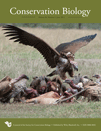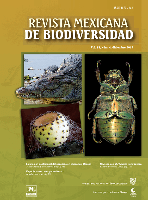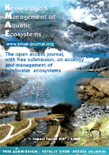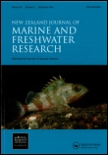
BIOLOGY AND ENVIRONMENT-PROCEEDINGS OF THE ROYAL IRISH ACADEMY
Scope & Guideline
Illuminating the Path of Biological and Environmental Science
Introduction
Aims and Scopes
- Biodiversity and Ecology:
Research on the diversity of species, their ecological roles, and the interactions within various ecosystems in Ireland, including studies on specific taxa such as mites, spiders, and aquatic organisms. - Impact of Environmental Change:
Investigations into how climate change, land use, and pollution affect ecosystems and species distributions, providing insights into the resilience and adaptability of Irish biodiversity. - Conservation Strategies:
Studies focused on conservation practices, restoration ecology, and the implementation of nature-based solutions to enhance biodiversity and ecosystem services in Irish landscapes. - Agricultural and Aquatic Systems:
Research examining the relationship between agricultural practices and environmental quality, including water quality assessments and the impacts of agricultural intensification on biodiversity. - Microbial Ecology and Biodegradation:
Explorations of microbial communities in various environments, including studies on their roles in biodegradation and soil health, which contribute to sustainable practices in agriculture and waste management.
Trending and Emerging
- Climate Change Impacts:
An increasing number of studies are focusing on how climate change is altering ecosystems in Ireland, particularly in relation to aquatic systems and species distributions, highlighting the urgency of this issue. - Microplastic Pollution:
There is a noticeable rise in research addressing microplastic pollution in various ecosystems, emphasizing the growing concern over plastic waste and its ecological consequences. - Nature-Based Solutions:
Emerging research is exploring nature-based solutions for environmental challenges, such as water quality improvement and biodiversity enhancement, indicating a trend towards sustainable management practices. - Interdisciplinary Approaches:
A trend towards interdisciplinary research that integrates biological, ecological, and socio-economic perspectives suggests a comprehensive approach to addressing environmental issues. - Technological Innovations in Ecology:
The use of advanced technologies, such as DNA barcoding and in-situ monitoring, is becoming more prevalent, reflecting a trend towards leveraging technology for enhanced ecological understanding and data collection.
Declining or Waning
- Traditional Taxonomy:
While still relevant, there appears to be a reduced emphasis on traditional taxonomic studies, as researchers may be shifting towards ecological and functional approaches to understanding biodiversity. - Historical Ecology:
Research that focuses solely on historical ecological data seems to be waning, possibly as newer methodologies and technologies (e.g., genetic analysis) gain prominence in ecological studies. - Invasive Species Studies:
Although important, the volume of publications specifically addressing invasive species in Ireland has decreased, potentially indicating a saturation of research in this area or a shift towards integrated approaches that include broader ecological impacts.
Similar Journals

CONSERVATION BIOLOGY
Exploring innovative strategies for ecological sustainability.CONSERVATION BIOLOGY, published by Wiley, is a leading journal in the field of ecology and conservation, with a focus on disseminating high-quality research that addresses pressing environmental challenges. With a strong impact factor and categorized in the top quartile (Q1) across various relevant fields including Ecology, Evolution, Behavior and Systematics, and Nature and Landscape Conservation, the journal plays a pivotal role in advancing the scientific understanding of biodiversity and conservation practices. Since its establishment in 1987, CONSERVATION BIOLOGY has provided a vital platform for researchers, professionals, and students to share innovative findings and facilitate discussions surrounding ecological sustainability and conservation strategies. Although it is not an open-access publication, it ensures that a wide range of significant research is accessible to the global scientific community. The journal’s rigorous peer-review process and reputation for excellence make it an essential resource for anyone involved in the study of ecology and conservation.

Revista Mexicana de Biodiversidad
Championing Conservation through Innovative ResearchRevista Mexicana de Biodiversidad is a prominent academic journal dedicated to the field of biodiversity and conservation, published by the prestigious Instituto de Biología, Universidad Nacional Autónoma de México. Since its inception as an Open Access publication in 2005, it has aimed to disseminate high-quality research that advances the understanding of biological diversity in Mexico and beyond. With an ISSN of 1870-3453 and an E-ISSN of 2007-8706, the journal caters to a diverse audience, including researchers, professionals, and students, by providing vital insights into ecological studies, conservation strategies, and the sustainable management of natural resources. The journal is committed to fostering scientific collaboration and promoting the significance of biodiversity in addressing contemporary environmental challenges. By publishing innovative and impactful research, the Revista Mexicana de Biodiversidad plays an essential role in the global discourse on biodiversity conservation.

Forestist
Exploring the future of forest management and conservation.Forestist, published by AVES, is a pivotal open-access journal dedicated to the field of Forestry, providing a platform for researchers, professionals, and students to explore cutting-edge developments and research within the discipline since 1980. Operating from Turkey, this journal offers a unique opportunity for scholars to share their findings with a broad audience, contributing to the global discourse on sustainable forest management, conservation practices, and ecological research. With an impressive impact factor and a current categorization in the Q3 quartile for 2023, Forestist ranks among the essential resources in Agricultural and Biological Sciences, particularly within the realm of Forestry, as indicated by its Scopus ranking of #119 out of 174 journals. This publication is committed to fostering open access to knowledge, making research freely available while encouraging innovative studies that address the pressing challenges in forestry and environmental science.

APPLIED ECOLOGY AND ENVIRONMENTAL RESEARCH
Fostering dialogue and collaboration in applied ecological research.Applied Ecology and Environmental Research is a distinguished journal published by ALOKI Applied Ecological Research and Forensic Inst Ltd, located in Hungary. Since its inception in 2003, the journal has provided a pivotal platform for the dissemination of innovative research and discussions pertaining to applied ecology and its intersection with environmental sciences. With its ISSN 1589-1623 and E-ISSN 1785-0037, the journal boasts a respectable presence, achieving a Q3 ranking in Agronomy and Crop Science and a Q4 ranking in Ecology, Evolution, Behavior, and Systematics as of 2023. This reflects its commitment to publishing high-quality research that is vital for advancing knowledge in these fields. While it primarily operates under a subscription model, authors and institutions are encouraged to contribute meaningful research that sparks dialogue and fosters collaboration among a diverse range of stakeholders in ecological research. Researchers, professionals, and students alike will find valuable insights and contributions that address contemporary environmental challenges and promote sustainability. Join the community of scholars who are shaping the future of ecology and environmental research through this impactful publication.

Floresta e Ambiente
Empowering knowledge for a sustainable future in forestry.Floresta e Ambiente is a pioneering open-access journal dedicated to advancing knowledge in forestry and environmental science, published by the Federal Rural University of Rio de Janeiro's Institute of Forests. Since its inception in 2012, this journal has emerged as a crucial platform for researchers, professionals, and students to disseminate innovative findings and foster discussions on sustainable forest management, conservation practices, and the ecological significance of forests in Brazil and beyond. With an impressive impact factor and a commendable ranking in the SCOPUS database, positioned in the 49th percentile of the Agricultural and Biological Sciences category, Floresta e Ambiente actively supports the dissemination of high-quality research while contributing to the global discourse on forestry. As an open access journal since 2013, it ensures that valuable knowledge is readily available to all, enhancing collaboration and engagement within the scientific community.

VIE ET MILIEU-LIFE AND ENVIRONMENT
Connecting Life and Environment for a Sustainable FutureVIE ET MILIEU - LIFE AND ENVIRONMENT is a pivotal journal in the realms of aquatic science and ecology, serving as a vital platform for researchers and professionals interested in the interconnections between living organisms and their environments. Published by the esteemed OBSERVATOIRE OCEANOLOGIQUE BANYULS in France, this journal has been disseminating valuable research since its inception in 1980, with volumes covering various topics pertinent to environmental dynamics through to 2024. Despite its current classification in the Q4 quartile for both aquatic science and ecology, the journal offers a unique opportunity for scholars to contribute to niche areas often overlooked by more prominent publications. VIE ET MILIEU is committed to fostering a comprehensive understanding of ecological interactions and the conservation of aquatic ecosystems, making it an essential resource for those engaged in environmental science and biology. Researchers can access a wealth of knowledge that supports their work, encourages collaboration, and inspires innovative approaches to pressing ecological issues.

BOREAL ENVIRONMENT RESEARCH
Fostering Interdisciplinary Dialogue on Boreal ScienceBOREAL ENVIRONMENT RESEARCH is a noteworthy academic journal published by the Finnish Environment Institute. Focusing on interdisciplinary studies within the realms of Agricultural and Biological Sciences, Atmospheric Science, Ecological Modeling, and Pollution, the journal aims to foster research that contributes to an improved understanding of boreal ecosystems and their interactions with global environmental changes. With an H-Index indicating a significant impact in the field and a convergence period extending from 1996 to 2024, BOREAL ENVIRONMENT RESEARCH serves as a platform for researchers, professionals, and students alike, promoting high-quality, peer-reviewed articles that address pressing environmental issues. Although it operates on a subscription basis, the journal's robust categorization within Q3 and Q4 quartiles highlights its relevance and commitment to facilitating academic dialogue and collaboration. Located in Helsinki, Finland, this journal stands as a vital resource for those dedicated to understanding and addressing the complex challenges faced by boreal environments.

Knowledge and Management of Aquatic Ecosystems
Innovating Insights in Water Science and ManagementKnowledge and Management of Aquatic Ecosystems, published by EDP SCIENCES S A, is a premier open-access journal dedicated to the interdisciplinary study of aquatic ecosystems. With an ISSN of 1961-9502 and an impressive history since 1928, this journal serves as a vital resource for researchers and professionals in the fields of Ecology, Aquatic Science, Water Science and Technology, and Nature Conservation. The journal has consistently achieved high rankings, including a Q2 classification in multiple categories, which underscores its significant contribution to the evolving landscape of aquatic research. With access options that promote widespread dissemination of knowledge, Knowledge and Management of Aquatic Ecosystems aims to bridge gaps in research, policy, and practical applications, making it an invaluable asset for students, researchers, and policymakers aiming for impactful solutions in aquatic management and conservation.

Acta Botanica Mexicana
Connecting global researchers to ecological challenges.Acta Botanica Mexicana is a premier journal published by Instituto de Ecología AC, dedicated to advancing research in the fields of ecology, plant science, and biological sciences. With an E-ISSN of 2448-7589, this open-access journal facilitates extensive dissemination of scientific findings, ensuring that knowledge is accessible to researchers, professionals, and students worldwide. Established in 2008, Acta Botanica Mexicana has earned a notable reputation, achieving a Q3 ranking in plant science and a Q4 ranking in ecology and evolution for 2023. This positioning underscores its commitment to publishing high-quality research that addresses vital issues in ecological and botanical studies. With a focus on innovative methodologies and pragmatic solutions, the journal invites contributors to share their insights and findings, thus enriching the academic landscape and fostering collaborations that drive the field forward. The journal is based in Michoacán, Mexico, and serves as a key hub for researchers engaging with the challenges and intricacies of plant and ecological studies.

NEW ZEALAND JOURNAL OF MARINE AND FRESHWATER RESEARCH
Navigating the Future of Aquatic EcologyNEW ZEALAND JOURNAL OF MARINE AND FRESHWATER RESEARCH, published by Taylor & Francis Ltd, stands as a distinguished platform for the dissemination of innovative research in the realms of aquatic science and ecology. With an ISSN of 0028-8330 and E-ISSN 1175-8805, this journal has been curating significant scientific contributions since its inception in 1967, continuing through to 2024. Recognized in the Q2 category across multiple relevant fields—including Aquatic Science, Ecology, and Water Science—this journal ranks notably in Scopus, with a 74th percentile for Ecology, Evolution, Behavior and Systematics, highlighting its impact and relevance within the scientific community. Though not an open-access publication, its rigorous peer-reviewed articles offer insights that resonate with researchers, professionals, and students who are passionate about advancing our understanding of freshwater and marine ecosystems. By fostering a collaborative space for ecological and environmental inquiries, the NEW ZEALAND JOURNAL OF MARINE AND FRESHWATER RESEARCH is essential for those aiming to contribute to the vital conversations around biodiversity, conservation, and sustainable management of aquatic resources.